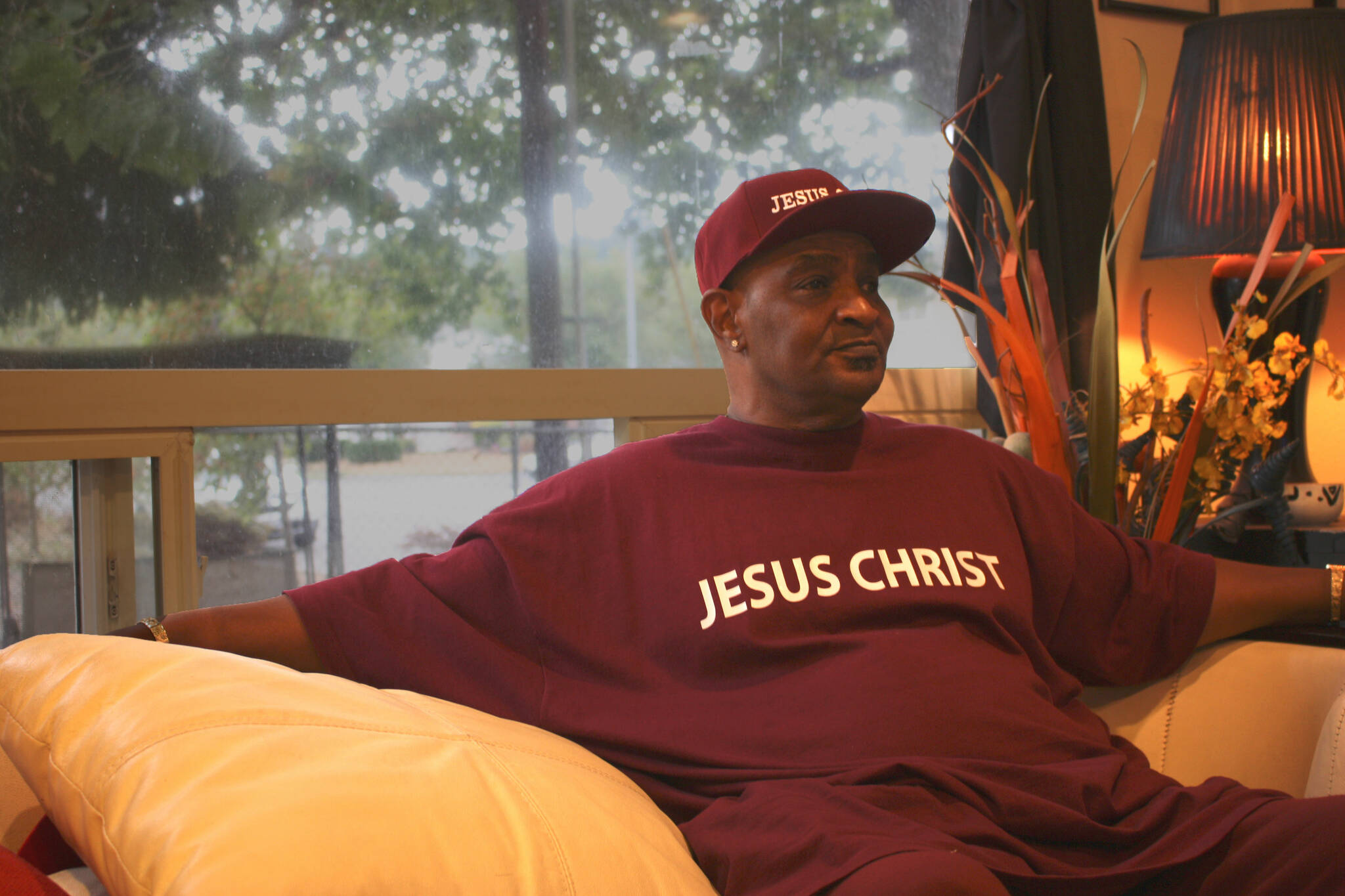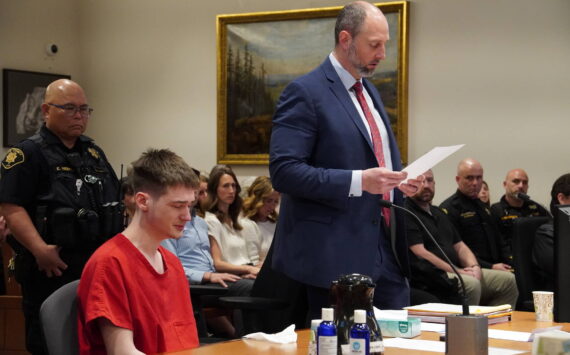James Encinas felt that he was hired as a minority “token” when he joined Harborview Medical Center as a peer support specialist for their Housing And Recovery Through Peer Services program, which helps to find housing for the homeless and to get folks the support they need to get off the streets.
As a former addict himself, James could relate with and provide mentorship to the clients he helped get clean and off the streets. He has been sober for nearly two decades after suffering from substance abuse issues for more than 40 years of his life.
“I survived the very same trauma that they were going through,” he said.
It was the unresolved trauma from the abuse he suffered as a child that became a problem he would suppress through the abuse of substances. James found himself in and out of incarceration throughout his life, stemming from his chemical dependency and other risky behaviors.
It was behavioral health programs like Harborview’s HARPS that helped James get himself sober and in a position to help others who were struggling like he had been. He would credit the help and support he received from a behavioral health specialist as part of what allowed him to make a new life for himself.
He liked his job as a peer support specialist because he could help people and he was good at it. He helped many people get into housing through the HARPS program, exceeding expectations.
In less than a year he was able to help nearly 30 formerly homeless individuals become self-sufficient to the point where they could pay their own rent. He would be given an award from Harborview Medical Center recognizing his service. Former clients wrote notes to James after they became self-dependent, thanking James for his support, and even at times crediting him with saving their life.
However, James said his success would be forgotten. He would be alienated, bullied and gaslighted, he said, before an effort made to get rid of him — rising all the way to the human resource representatives and program administrators – would prove successful.
Using the protective resources available to him
There were instances in which James said he felt racially discriminated against and even bullied on the job, not by one single individual, but by several, including supervisors, peers and health care professionals he worked closely with.
When James experienced these workplace transgressions, he used the resources and systems that were available to him, the same ones that were intended to protect all employees.
Numerous reports were made by James and complaints were filed over multiple years. The complaints were often forgotten, seemingly ignored. Even when other coworkers noticed instances of racist micro-aggressions, sexual harassment, hostile work environments, even workplace assault, it seemed like accountability was never upheld.
Many of his complaints went unaddressed for months at a time. A lot of them went unacknowledged until James was being fired for reasons that he said simply did not add up.
As someone who had been victimized by abuse, James does not think of himself as a victim, but rather a “victor.” He is strong in his will and in his moral compass and he refused to be silenced or ignored.
“When I got my voice back, I was focused on one thing,” James said. “Never being lied to again, because the lies hurt more than the abuse.”
James knows what it is like to be gaslighted and invalidated after blowing the whistle. As a young victim of abuse, he had been made to feel like a liar when he called for help.
He kept careful records of the complaints he filed, the responses he received, the retaliatory communications he garnered, and the attempts to invalidate his experience and tarnish his character in this new workplace.
Pattern of bullying and discrimination
Initially, James often had issues with the HARPS Program Coordinator, Lisa Lovejoy. Just before June 2018, James filed a complaint with the HR Department at Harborview Medical Center, alleging a pattern of inappropriate behavior and conduct by Lovejoy and a few other employees, including his supervisor.
James wrote in his complaint that a few days before, Lovejoy cornered him and demanded that they speak about a union-related dispute. James wrote that he expressed to her that it was not the right time or place to speak about union matters.
According to the complaint, she continued to berate him about this dispute and physically cornered him and blocked his path when he tried to leave. Eventually she said “shut your mouth James,” and when James said she had no right to say that, she told him that she did have the right to tell him to “shut up.”
In the same complaint, James alleged that Lovejoy regularly made comments like “why do you even work here James?” or “This is the [Harborview Medical Center] way James, and if you don’t like how things are done, maybe you should find another job.”
He also wrote in an HR complaint that both Lovejoy and their supervisor, Martha Lindner, witnessed a female employee call James a “monkey,” a term that James interpreted as a racial slur. The complaint alleges that neither Lovejoy nor Lindner reported the instance to HR, nor did they even acknowledge the interaction.
James and his supervisor, Lindner, also witnessed Lovejoy grabbing the arm of the female employee during a verbally aggressive workplace altercation. James wrote to the HR department via email about this incident expressing that the work environment felt unsafe.
In November of that year, Lindner, who was not a Human Resources Consultant, wrote to the female employee, the victim of Lovejoy’s alleged assault, explaining that the investigation of Lovejoy’s actions had been closed.
“I was able to substantiate your concerns about the verbal tone with which you were approached. I was also able to substantiate that you were stopped and your arm was held as you attempted to leave your work area, though I was unable to substantiate your claim of being held forcefully in a prolonged manner,” wrote Lindner to Evans on Nov. 8, 2018.
James said he began to notice a pattern of his reports to Human Resources and his supervisors being ignored, and the “investigations” of his claims being slow and less than transparent.
On June 3, 2019, Senior Human Resources Consultant Nola Balch emailed James regarding his complaints from over a year ago. She said she had “findings” that a “number” of James’ concerns were “valid.”
She also wrote that she determined that Harborview Mental Health Services leadership does “not consistently and effectively follow up on employee complaints/concerns” and that “Human Resources did not ensure effective communication/guidance on some process matters” pertaining to specific complaints.
James wrote back to Balch the next day, asking why his initial complaint about Lovejoy took over six months to investigate and warranted an outcome that did not prevent her from assaulting that female employee in a similar way. He also asked why a complaint filed against him was investigated to completion in less than 30 days.
“I have beyond question been harmed by my co-workers, then further harmed by the process that is supposed to protect me, without fear of reprisal [or] reprimand of retaliation?” James wrote to Balch.
A spokesperson for Harborview Medical Center declined to comment for this story because the medical center cannot comment on personnel matters.
Federal discrimination complaint and response
On June 27, 2019, James took his complaints of racial discrimination and a hostile work environment to the Equal Employment Opportunity Commission, the federal office established to protect employees from unfair and illicit discrimination.
A representative from his employer’s complaint investigation and resolution office wrote the EEOC back, denying all of James’ allegations — making him feel that he was being gaslighted by calling him “unreasonable,” “unprofessional” and “insubordinate.”
The Title IX investigator for the University Complaint Investigation and Resolution Office, Kati Lappi, wrote on Aug. 19, 2019, the results of her investigation and response to James’ Federal EEOC complaint. She denied every single allegation James made in the EEOC complaint, of which there were almost a dozen transgressions over multiple years.
She denied claims that racist comments were made in the workplace, even when employees had corroborated that the statements were made. When supervisors and medical professionals were acknowledged as having made off-color comments or behaving unprofessionally, Lappi wrote about it in a way that framed the incidents as having minimal impact and harm to James and other employees.
For example, when a mental health practitioner referred to a patient of color as an “animal,” which James interpreted as a racially biased comment, Lappi excused this behavior in her document, writing that the staff member acknowledged that he may have been “less than articulate when he made the statement.” She justified the context of the employee’s comments, writing that they were made at a meeting that was “intended to be cathartic and to allow people a safe space to express their feelings.” Lappi also wrote that the patient was white and not a patient of color, a fact that James refutes, recalling the patient as Latinx.
Lappi’s responding document to the EEOC complaint references James’ past infractions, which he said he felt were not relevant and were brought up to discredit his character. Lappi’s response even refers to his physical weight and size as a way to justify an employee’s fear of him.
The people who were responsible for investigating James’ workplace complaints claimed witnesses and parties involved were interviewed, but James says he was never a part of those conversations despite being the victim.
Less than five months after James filed his EEOC complaint against his employer, he was fired.
Retaliation and collusion against James
On Aug. 8, 2019, James received a formal notice from Jerome Dayao, chief nursing officer of HMC patient care services, notifying him that he was being placed on immediate leave “pending the investigation into a report of unprofessional and intimidating behavior.”
The report that was put together about James’ transgressions was complete by the end of August. Multiple times the report, written by HR consultant Nola Balch, mentioned non-verbal communication made by James, mostly eye contact made by James that was described as “scowling,” “glaring,” “stare-downs,” and “dirty-looks.”
It is worth noting that James has a noticeable injury to his left eye. It is unclear if the appearance of his eye played a role in how his glances were perceived.
The report described the interpretation of these looks as “dirty looks with an intent to antagonize/communicate maliciousness.” It claimed that these non-verbal communications had occurred over a period of months, but cited in detail one very specific example involving a female coworker.
The report indicates that this event happened on Aug. 7, one day before James was notified that he was being placed on administrative leave. The report described the incident to James like this:
“You walked past at the end of the hallway towards the outside/drop-in. It is reported that upon seeing [the female coworker], you slowed down significantly, caught her eye and looked her up and down slowly, twice, with a scowling/angry look on your face you held her eyes as you moved away down the hallway.”
What is notable about this report is the unique detail of how it is described in this document. The detailed account of the “dirty look,” comes in stark contrast to how other events and allegations are investigated and described in other documents James received from Human Resources, administrators and his supervisors.
When those investigations are complete, the reports often avoid the details of the specific harmful language used, or in the claims against Lovejoy, they do not admit that violence occurred or that a verbal assault occurred.
The claims against Lovejoy, substantiated by multiple employees, certainly seem to be “intimidating” and “hostile,” two words that James’ supervisor Martha Lindner characterized him as in workplace counseling document — yet James, a man with a damaged eye, was punished for “glaring,” and perceived “scowling.”
One of the last things referenced in this document involves a photo that was taken of James and two of his more supportive co-workers and was posted after work hours on James personal Facebook account.
James said he felt the intent of this post was misinterpreted, possibly deliberately, and a narrative was fabricated against him by some of his coworkers.
The narrative that was reported was that James sent his coworkers the Facebook post as a way to intimidate them. James said he later brought forth phone records to HR representatives that proved that he never sent the Facebook post to any of his coworkers, and they instead shared the Facebook post among themselves.
The Facebook post in question was one that was made on Aug. 9, one day after James was placed on administrative leave. It was a Friday, the end of the work week.
The post was a picture of James and two of his more supportive coworkers, posing together after a lunch they had together. Both of these coworkers had also filed complaints or reports against both supervisors and peers discriminating or bullying James.
James claims the caption was a reference to his rocky relationship with his wife. They were in the middle of separating at the time. He feared she was relapsing into a life of addiction, one that if he joined her in, he knew he would not survive. So he had no choice but to push her out of his life to maintain the sobriety that he had worked so hard to keep.
One of James’ coworkers alleged that he was sent this post via text message directly from James as a way to intimidate him, despite phone records that indicate that this was not true.
Several other coworkers corroborated this version of events.
In contrast to the speed in which Human Resources had typically investigated complaints and allegations, by the end of the same day in which the allegation was made, HR consultants had already discussed notifying James that he had violated the terms of his leave via email.
James was told in September 2019 that he could return to work under the conditions of a final action plan. He returned to work in October 2019.
On November 21, 2019, HARPS supervisor, Martha Lindner, who was also so mentioned in James’ EEOC complaint just months before, wrote a letter to Executive Director at Harborview Medical Center, Paul Hayes, recommending James’ dismissal from the program.
The reason for recommending his termination was for “failing to meet the expectations for professional conduct outlined by his Final Counseling Action Plan.”
Specifically, Lindner cited points in the Final Counseling Action Plan that emphasized professionalism in James’ conduct and in his “verbal, written and non-verbal communications.”
The SEIU Local 925 Union Shop Steward that represented James in his resolution with the company, Daniel Bascom said that “non-verbal” communication was a “problematic” standard to cite because it is not concrete and can be misinterpreted.
Daniel Bascom was one of the few people that James felt truly represented his best interests and believed in his experience and his story. He saw the narrative of discrimination through the patterns in which Human Resources and other workplace conflict resolution offices not only ignored James’ complaints and shrugged off accountability, but then also allowed and in some ways promoted retaliation against James.
Bascom said he intended to see James’ case through to the end, until true accountability was had and the injustices against James were acknowledged.
However, before a conclusion to James’ case was reached, Bascom was offered a position by the same organization that he was representing James against, the University of Washington. It was a similar position to what Bascom had applied for months before and so it was difficult for him to turn down. When Bascom asked the university if he could still represent James in his case, he said he was told “no.”
James felt that the next union representative he was given, Anjulie Knowles, was not as interested in making the best effort to represent him. He said at times, he even questioned her integrity as he asked her to take actions in the case that she would not do for him.
The other point raised during James’ dismissal was that James often writes emails with some phrases or sentences written in all capital letters. This was an issue raised in James’ Final Counseling Action Plan and was written in a way that framed James’ use of all capital letters as angry or yelling.
For James, using capital letters was not only a way to emphasize a point, but with a blind left eye, it helped him see what he was writing. When he first began working at Harborview Medical Center, he wrote to his peers explaining that his use of capital letters did not indicate that he meant to yell.
“When I learned to write on a typewriter, I never learned that all caps meant you were yelling,” James said.
James educational background was much different than many of the social workers and medical experts he worked alongside. Some of James’ more supportive coworkers understood this and found the issue of his use of capital letters to be more or less arbitrary in terms of true professionalism.
“You might have your APA style when you wrote to get your master’s [degree], this is my style,” a co-worker remembers him saying.
Two social workers that worked closely with James, including Kristi Dore, noticed what they considered to be discrimination against him as well. They even advocated on his behalf to their supervisors and human resources.
One spoke on James’ behalf to her supervisors for a year before she turned to Human Resources only to be ignored. She said she eventually left the program because of the toxic work environment.
Even though both co-workers noted James’ professionalism, integrity and compassion he exemplified through his work to help others, James’ professionalism was frequently questioned by his superiors and human resources.
James said he felt his background, the way he spoke, the way he wrote emails were all things that were used against him by his peers and supervisors as a way to characterize him as unprofessional, despite the effectiveness he displayed in his role and the impact he was having on people’s lives.
“His specialty was working with [clients] that quite honestly, others were scared of,” said Dore.
During one incident, a problematic client that often engaged in altercations with staff had a verbal outburst, likely tied to a mental breakdown, in which he threatened a female staff member with sexual assault. All the staff members who witnessed this were shocked and disgusted by what was said.
Other staff members that witnessed this incident said for a moment, no one knew how to react or what to do with this potentially violent client. In an attempt to safely de-escalate the situation, James said he did what no one else there would do and approached the man and offered him a cigarette.
“C’mon man, let’s go smoke outside,” James said, and escorted the man outside to gather his head and emotions.
Dore elaborated on the passion that James would speak with when he communicated with coworkers and clients. At times, some employees complained about the volume at which he spoke or his willingness to do so.
She said James was not one to blindly follow orders, because he believed in standing up for what was right.
Dore wondered if James’ did not fit into an idea of what professionalism is because that idea was viewed through a racialized idea of what a professional should be.
On March 20, 2019, multiple documents indicated that during a meeting Director of Behavioral Health at UW Medicine, Briggite Folz, made the comment: “That’s why white people are in the position that they’re in, Black people don’t know how to be on time to meeting, unlike white perfectionism.”
This incident was mentioned in James’ federal EEOC complaint against Harborview Medical Center.
UW’s Title IX Investigator, Kati Lappi, responded to this point calling it “unrelated,” to the discrimination complaint. She also attempted to clarify that when Folz was interviewed she said that while she did say “this might be a reflection of white perfectionism” during the meeting, it was “concluded” that she did not state that “that’s why white people are in the position they are in,” or that “Black people don’t know how to be on time.”
Lappi added that a UW investigator did admit that Folz comments were “informed by bias,” but that there was no “tangible employment action” to be taken and that no hostile work environment was created by the comments. Folz’s apology email to Harborview staff was regarded as part of a sufficient resolution to the issue.
James regards this response as just one of many examples of how university representatives will acknowledge that an action was based in or informed by bias, but will not acknowledge the harm it did to subtly avoid accountability in a way that the system allows.
He said it is the details of these aggressions that matter in terms of identifying racially-biased behavior, yet it is the details that are avoided, omitted, or tip-toed around in these documents. The nuanced language refuses to admit when bias is present, even when multiple employees have corroborated and reported that it does.
“Anytime they got caught saying something racist, it was called an isolated incident,” James said.
For James and his peers, they felt this was a hurtful and abusive pattern of lies that only served to protect the institution.
On Sept. 9, 2019, UW Human Resources representative, Nola Balch, offered James a settlement worth one-half his yearly salary under the conditions that he abandon his grievance claims as well as his complaint with the EEOC.
James said when he declined this offer he was offered two more settlements, each one larger than the next.
As a survivor of violence and abuse through both his juvenile and adult life, safety was important to James. He felt like both he and his co-workers deserved to work in a safe environment free from discrimination, harassment and hostility.
“Before there can be healing, there needs to be acknowledgement,” James said.
Sobriety at stake
James had been driven in his efforts for accountability. Every step of the way he kept records documenting his efforts and communications with agents that belonged to systems which were designed to uphold justice, accountability and protection for people like himself who had been victimized by their employer, their peers and even the clients they pledged to help.
The stress of being denied accountability over and over weighs heavy on James.
“These are the things that put my sobriety at risk,” James said.
As his efforts continue to be shrugged off by the systems he should be able to rely on, he continues to lose trust.
He keeps a laminated set of documents that include his driver’s license, his insurance, and his diploma. All items that he believes will speak to his credibility and legitimacy as a civilian if ever pulled over by the police. These are all items he hopes might save his life from what he fears could be a racially profiling cop.
“When I hand this over, it’s in God’s hands.” James said of the laminated packet.
James’ preparation and focus on documentation is one that is a survival tactic. Born out of bearing abuse from a young age and then continued in his adult life, it is something he does to protect both himself physically, as well as psychologically.
He likens the gaslighting he endured as a juvenile victim of abuse to the gaslighting he said he endured from the administrators and supervisors at Harborview and UW Medicine.
“The ability to address the details is rooted in trauma,” James said of efforts to avoid the gaslighting and truth-bending tactics used by abusers and victimizers. He knows how important the details can be in representing what really transpired and how details can be ignored and distorted to avoid shame and accountability.
“Through it all,” James said. “They never expected me to maintain my integrity and to document it all.”








